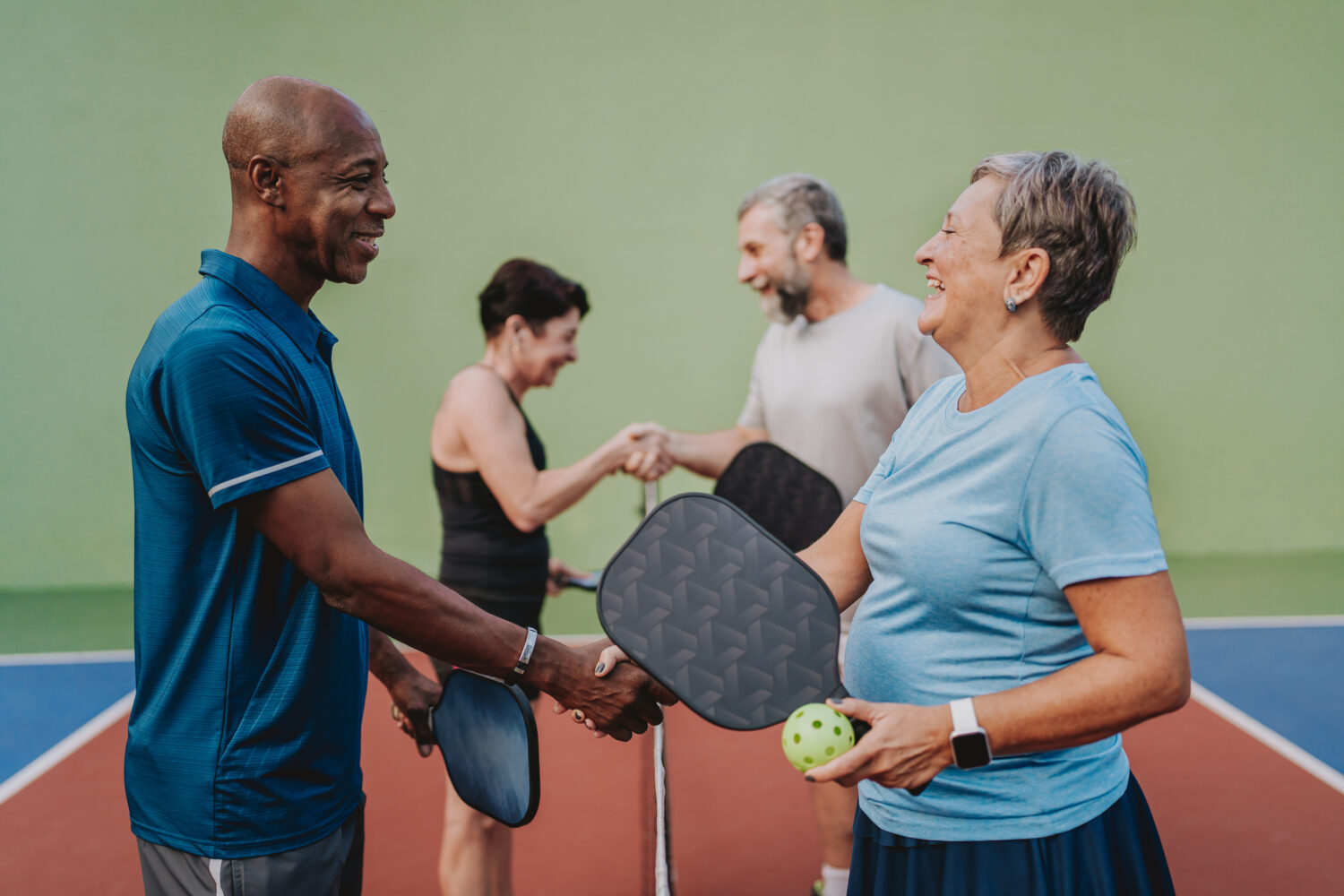If you’ve been anywhere near a park or rec center lately, you’ve probably heard the familiar pop-pop-pop sound of pickleball paddles hitting plastic balls. This wildly popular sport has won the hearts of players across all ages, especially seniors and active adults. But beyond its entertaining and fast-paced gameplay, did you know pickleball might also be a secret weapon for boosting your mental health?
Here’s why grabbing a paddle and stepping onto the court could be the best thing you can do for your mind, body, and soul!
Active Body, Happy Mind
Science has long linked physical activity to improved mental health, and racket sports like pickleball stand out as a fun and effective way to boost your mood. When you move your body, it releases endorphins—those feel-good chemicals that naturally help reduce stress and anxiety, leaving you feeling happier and more relaxed. Pickleball, being a moderate-intensity sport, keeps your heart rate up without feeling overly strenuous, making it an enjoyable way to reap the mental and physical benefits of exercise.
Beyond the mental health perks, pickleball offers several physical benefits as well. It’s excellent for improving coordination, balance, and reflexes, which are crucial for maintaining mobility and preventing falls, especially as we age. The quick, precise movements required to play help keep your body agile and responsive. Playing regularly can also improve cardiovascular health and overall endurance, helping you stay fit while having fun.
A healthy body fosters a healthy mind, and an enjoyable day on the court might leave you feeling more relaxed, less anxious, and free from the weight of depression.
The Social Connection
Ask anyone why they love pickleball, and most will tell you it’s more than just a game—it’s a community. Whether you’re cheering on your doubles partner or chatting between matches, pickleball thrives on connection.
Socializing is particularly important for mental health, as studies show regular interaction with others lowers feelings of loneliness and depression. Pickleball’s casual, inclusive nature creates an easy space to meet new people, make friends, and feel like you’re part of a team.
And since pickleball courts tend to bring together players of all skill levels and ages, it’s a sport where intergenerational friendships often blossom. Your doubles partner could just as easily be a 25-year-old beginner as a 75-year-old champ!
Game, Set, Brain Health!
Here’s where it gets really interesting. According to studies, racket sports like pickleball may actually help reduce your risk of dementia. A 25-year study published in the journal Neurology found that regular physical and social activities significantly lower the odds of cognitive decline.
Pickleball provides a triple threat to keep your brain sharp:
- It engages your mind with strategic gameplay, keeping those neural connections firing.
- The quick reflexes and hand-eye coordination required strengthen brain function.
- And the social connections stimulate a part of your brain responsible for emotional regulation and memory.
By taking care of your mental and physical health through pickleball, you may also be helping your long-term cognitive health in ways you never expected.
Low-Pressure, High Fun
Unlike some sports that feel competitive or intimidating, pickleball has a relaxed, low-pressure vibe. The rules are easy to learn, the pace can adjust to your comfort, and silly moments (like accidentally whiffing the ball) are part of the fun.
This sense of ease makes pickleball a great stress reliever. It encourages mindfulness by keeping players present and focused during the game. And laughter or light teasing on the court can add to the joy of playing, turning even a short match into a mood booster.
It’s Never Too Late to Start
Pickleball isn’t just for seasoned athletes or young players; it’s an incredibly accessible sport for people of all ages and fitness levels. Its small courts minimize running, making it a gentle option for seniors or anyone with joint concerns. Plus, the welcoming pickleball community means you can jump in as a complete beginner and be met with smiles and support.
Starting something new like pickleball can enhance your sense of purpose and achievement. Setting small goals, like learning a new technique or improving your serve, gives you something positive to work toward. That sense of progress boosts confidence—which is great for mental well-being!
Get Ready to Dink!
Pickleball is more than just a sport; it’s a recipe for better mental health. By combining physical activity, social connections, and brain engagement, it’s proving to be an all-star activity for anyone looking to improve their mood, reduce stress, and strengthen their cognitive health over time.
If you’ve been curious about trying pickleball, now’s the perfect time to grab a paddle and hit the court. Whether you’re in it for the laughs, the cardio, or the friendly competition, you’ll quickly discover pickleball is so much more than a game.
